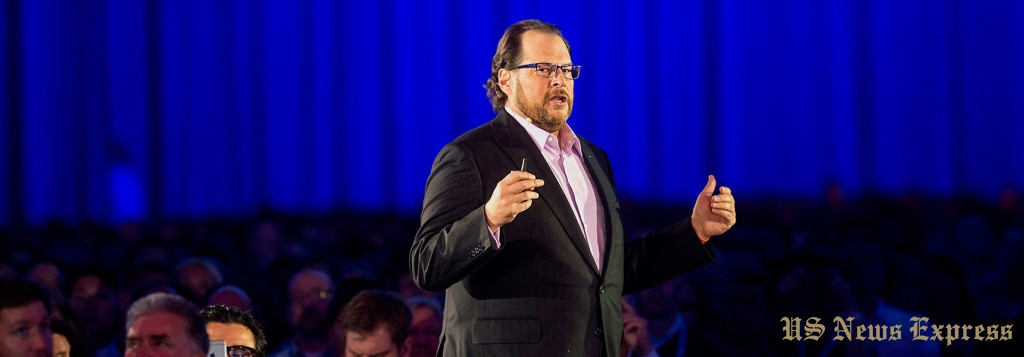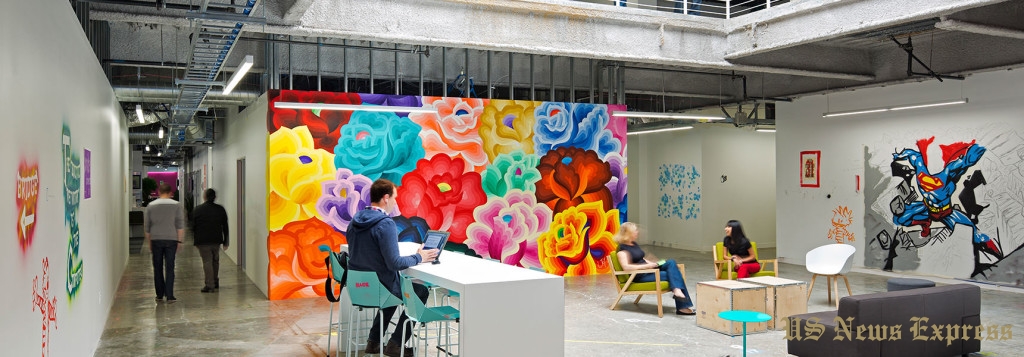These 40 companies are the best in the U.S. at attracting and keeping top talent, according to LinkedIn data.
1, Google (Internet)
In the arms race for perks, few can top Google. The company lavishes its 60,000 workers with mountains of food, A-list speakers, on-site massages — even benefits after death, as HR chief Laszlo Bock shared. The bigger draw, though: working on noteworthy projects with “impatient overachievers,” as one ex-Googler wrote on LinkedIn. The company obsesses about employee happiness, rigorously studying how to build the perfect team. It doesn’t allow managers to make hiring decisions — removing bias — and bases pay on the job, not someone’s prior salary, to close the gender gap, Bock wrote.
2, Salesforce (Internet)
While planning its new San Francisco office, Salesforce took design advice from an unlikely source: Buddhist monks. They were visiting CEO Marc Benioff (above) and suggested that he add quiet areas to his workplace. So Salesforce listened, installing “mindfulness zones” and meditation spaces on every floor of its new tower. The cloud software provider is serious about wellness: “employees can’t guide customers to success if they aren’t first taking care of themselves,” it told LinkedIn. It employs 20,000 and is known for high-growth, above-market pay and lots of philanthropy. Salesforce has long offered paid volunteer time off; this past year, it upped the perk from six business days to seven.
3, Facebook (Internet)
When you’re competing for the most cutting-edge engineers — and you need an army of them each year — a culture that brings them in the door isn’t just a competitive advantage, it’s a must-have. Facebook promises that those people who are builders will get plenty to work with at the company: managers “set them free” to conquer projects. There are plenty of benefits for life outside the office, too. Last year, Facebook extended its four-month paid parental leave program to all full-timers. Another draw: The strength of its business. Revenue has increased by more than 40 percent for 14 straight quarters. As startup life gets more difficult, the appeal of landing at a growing safe-haven like Facebook is appealing: It recorded a 34 percent increase in new hires during our Top Attractors reporting period.
4, Apple (Consumer electronics)
Last year, Apple introduced a novel benefit, doling out restricted stock units to the vast majority of its more than 100,000 employees. The move — unheard of among companies with a large base of hourly retail workers — brought raves on LinkedIn. But it’s Apple’s “transformative” products that account for the “essence of employee satisfaction,” HR chief Denise Young Smith said last summer. While CEO Tim Cook (above) jokes that Apple has “more secrecy here than the CIA,” ex-employees gush on LinkedIn about talented co-workers and great flexibility. The company’s diversifying, too: It hired 11,000 women during a recently reported 12-month period, a 65 percent increase.
5, Amazon (Internet)
Amazon used to have ambitions to be the “everything store.” Now it’s on path to be just “everything.” As a cloud-computing powerhouse, device manufacturer, voice-driven AI pioneer, and drone-delivering dreamer, it’s hiring needs are diverse and demanding. Amazon got some bad press after the New York Times called it a “bruising workplace,” a characterization one Amazon engineer famously disputed. Our data shows that the NYT didn’t make a dent: Applications for Amazon jobs are up 25% since last year. The company provides excellent salaries and such perks as the Amazon Career Choice Program, which pays 95 percent of tuition for in-demand fields. Women in tech are championed, too; Amazon Women in Engineering provide ongoing mentorships.
6, Uber (Internet)
Uber, the poster child for the gig economy, has become one of tech’s elite destinations for engineers, operations and product managers. Word is that the interview process is grueling — but worth it. It may be different for independent contractor drivers, but its 6,700 official employees enthusiastically back Uber’s mission to change livery as we know it. By far the most valuable unicorn, at $62.5 billion, Uber operates in 444 cities around the globe. While it has its critics, Uber has no problem attracting talent looking to change the world: It’s already looking past delivering people to delivering anything (UberEATS) and is an unabashed proponent of driverless cars (starting with an extended trial in Pittsburgh).
7, Microsoft (Computer software)
Microsoft continues to be a magnet for job-seeking techies. On its Redmond, Wash. campus, the company offers restaurants, cafes, espresso stands (37 to be exact), retail shops and a sports field. Another draw for candidates is Microsoft’s unique approach to career development: “an individual adventure,” as it’s called. Its 118,000 employees are encouraged to plot their own path, working towards becoming a specialist or a generalist. Management might suit one employee; working abroad in one of the 200 locations, another. Microsoft provides career resources like mentoring, coaching and 2,000 training programs. (Note: This list was finalized before Microsoft said it would acquire LinkedIn in a $26 billion deal. For more, read here.)
8, Tesla (Automotive)
Tesla has one of the healthiest public valuations in high tech — some $32 billion — and one of the leanest workforces: 13,000. It’s been recruiting a growing cadre of specialists in the nascent field of engineering for self-driving cars, a cohort for whose hearts and minds Tesla is battling titans Apple, Google and dozens of others. Trying to make that dream come true also requires people in design, IT, sales, customer service and traditional corporate roles — Tesla has more than 1,000 jobs listed on LinkedIn alone. Founder/CEO Elon Musk says he prefers company rules to company values, which can be “fairly obvious mom-and-apple-pie stuff.” One rule, as he noted at a conference last year: Employees who find meetings a waste of time are expected to get up and leave.
9, Twitter (Internet)
Weeks after being named CEO last fall, Twitter’s Jack Dorsey announced that he would give a third of his stock to employees – an amount worth, at the time, around $200 million. The unconventional move won praise across the web and, more importantly, cheers from Twitter employees. Since then, the company’s delivered more perks, like 20 weeks fully paid parental leave for all full-timers. Dorsey told CNBC’s Jon Fortt he gets inspired watching the Golden State Warriors and strives for that same “electricity” among Twitter’s 3,800 workers. But the real key to employee happiness, he told another interviewer, is “just being able to say, ‘I shipped that, and my mom is using it.’”
10, Airbnb (Internet)
The appeal of Airbnb, one former employee wrote on LinkedIn, boils down to this: “Airbnb is a travel company (awesome) that solves problems using startup gumption and innovation (awesomer).” The company is a sought-after employer not only because its business is so widely admired — it’s one of most valuable unicorns — but also because of its culture, which fosters a “sense of belonging,” the company told LinkedIn. Offices are decked out with the sort of homey details any Airbnb guest would appreciate: lounge areas with oriental rugs, meeting rooms designed after popular rentals, lots of house-made sodas. The company pushes employees to never stop “being crazy” and tries to inspire a sense of adventure by offering travel vouchers to experience Airbnb properties.






















